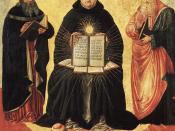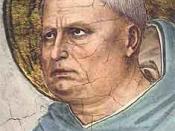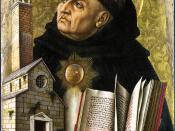Saint Thomas Aquinas (1225-1274) is a very influential figure in western culture in terms of his contribution to Natural Law theory. Furthermore, Saint Aquinas combined the art of Greek philosophy with biblical scriptures to establish a doctrine for the Catholic Church. St. Aquinas categorized law into four separate but interdependent aspects of law, the eternal law, natural law, divine law, and the human law. Aquinas believed that the natural, divine, and human laws were under the umbrella of what he defined as the eternal law. Aquinas illustrates that the purpose of Law is to lead man to a virtuous end; or a common good that man would never be able to obtain without the structure that reason and the law provide. Aquinas inferred that through mans god given gift of reason accompanied with the laws of nature man will be able to achieve a level of divinity almost god like.
The eternal law is defined by Aquinas as the law of the all-knowing creator of the universe God. Since God is the creator of all things in the universe, he can be interpreted as the governing body of all things. God alone is looked at as the skilled worker of all things by St. Aquinas due to the fact that he has been around since the inception of all things. "Therefore, just as the exemplar of the divine wisdom, inasmuch as all things are created by it, has the character of an art, a model or an idea, so the exemplar of divine wisdom, as moving all things to their due end, bears the character of law." (P119 Arthur, Shaw) The eternal law is nothing more than the model for divine wisdom. According, to Aquinas there is a hierarchy or a pyramid of sorts with god at the tip...


